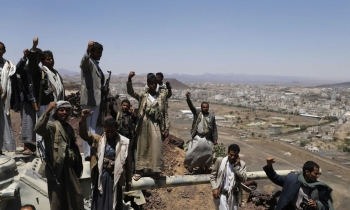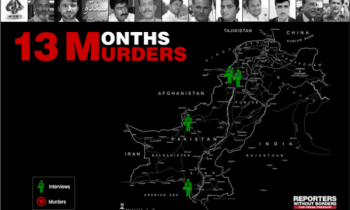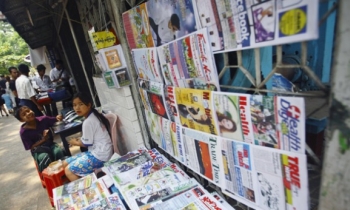Faisal Abbas Ghazala, the correspondent of the satellite TV station Kolsat was released on 21 December after more than a month in detention in Mosul. Accused of terrorism, Ghazala, 34, spent a total of 31 days detained in different locations. He was arrested by Kurdish security forces who stormed into his home in Mosul early in the morning of 19 November and dragged from his bed. He was held in two different police stations before being transferred to Dohuk prison near Mosul.
Reporters Without Borders greeted the release of the journalists but called
on the Kurdistan regional government to show greater care and moderation in its measures affecting the news media. Ghazala told the organization, “They entered my home with an arrest warrant without taking the trouble to send me a previous summons, to which I would have definitely responded,†he said. “They then held me for more than 30 days without being able to charge me. Iraqi journalists not only have to endure violence from militias and armed groups but also state terrorism.â€
It is believed that journalists are being subjected to more and more restrictions in Iraqi Kurdistan, which was until now regarded as a haven of peace and safety for the press. The media in Iraq's Kurdistan region are dominated by Barzani's Kurdistan Democratic Party and Iraqi President Jalal Talabani's Patriotic Union of Kurdistan, the region's main political parties. However, several outspoken independent and semi-independent newspapers - in addition to online news sites-have emerged over the last several years, providing critical coverage of local politics and government.
The regional government has used the recent clashes between the Turkish army and PKK rebels based in Iraq to restrict journalists’ movements and activities. On 11 December, the Kurdish national assembly voted a new draft law introducing heavy fines and prison sentences for press offences. The new press bill triggered a storm of criticism among Iraqi Kurdish journalists. They objected to increased financial penalties and restrictive provisions that were added to a draft version of the bill that had been under discussion among journalists and members of parliament for several months. The approved bill reportedly stipulates fines of up to 10 million Iraqi dinars (US$8,200) for journalists found guilty of a number of vague offenses such disturbing security, spreading fear, or encouraging terrorism. The earlier version of the bill prescribed much lower fines for similarly vague offenses.
The bill passed by parliament contained other restrictive provisions not included in the early draft, including amendments that would allow the government to suspend newspapers and a requirement that editors-in-chief be members of the Kurdistan Journalists' Syndicate (KJS), according to journalists who watched the parliamentary vote live on local television. Journalists also said the law would allow members of the press to be tried for criminal offenses under other Iraqi laws that allow for imprisonment.
Ghazala was accused of terrorism and spent a total of 31 days detained in different locations. He was arrested by Kurdish security forces that stormed into his home in Mosul early in the morning of 19 November and dragged from his bed. He was held in two different police stations before being transferred to Dohuk prison near Mosul. While held, Ghazala was questioned by his coverage of bombings that had taken place in the region.
On 19 November, the Kurdish regional government banned journalists from going to meet PKK rebels who have found refuge in the Qandil mountains on the border between Iraq and Turkey. The Euphrates News Agency (FHA) reported that Kurdish Prime Minister Nechervan Barzani met with media representatives a few days later and asked them not to publish articles “running counter to Turkish interests.â€
The new law has to be ratified by President Massoud Barzani in order to take effect. The president of Iraq's Kurdistan Regional Government (KRG) announced on 17th December that he will reject a restrictive new press bill that was approved by the regional parliament.
President Masoud Barzani told a delegation from the Kurdistan Journalists Syndicate (KJS) on Monday that he would not sign the bill once it reached his desk, pledging instead to send it back to parliament for revision, KJS head Farhad Awni told CPJ. Awni, who led a KJS delegation that met with Barzani this morning, expressed concern about the press bill, particularly several restrictions that were added prior to its approval last week. In rejecting the measure, Barzani stated "his full support for press freedom," a statement from the KJS said. It was unclear when debate would resume on the measure; Awni said it could take at least another 10 days before Barzani receives and vetoes the recently approved measure.
The Committee to Protect Journalists (CPJ) Executive Director Joel Simon said, "We welcome President Barzani's decision to reject this oppressive law, and we still believe that the KRG has a chance to enact model legislation for the region". But he also added that there is a need for much more to be done by the legislation to meet international press freedom standards and do away with vague prohibitions and other needless, restrictive provisions.
Meanwhile though the President’s words have been encouraging the for the time being, nothing has been decided over the bill.









